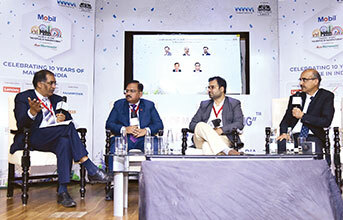
Moderated by Samir Bansal, General Manager of Off-Highway Research, the panel comprising Sanjay Saxena, COO, SANY India and South Asia; Navneet Sethi, Executive Vice President – Operations, JCB India; Shalabh Chaturvedi, Managing Director, CASE Construction Equipment, India & SAARC delved into the significance of construction equipment in India's development and how self-reliance in equipment manufacturing is the need of the hour.
Bansal set the stage by highlighting the crucial role of construction equipment in driving the nation's infrastructure development. He emphasised how these equipments serve as the lifeline of the country's progress, connecting every corner of the nation, from the highways that link cities to transportation networks like railways, and other infrastructure, these machines drive the economic growth of India.
Shalabh Chaturvedi, Managing Director, CASE Construction Equipment, India & SAARC, continued the dialogue by highlighting the complex nature of the construction equipment industry. He highlighted the potential for India to become a net exporter in this industry. "For this to happen, the government needs to incentivise the manufacturing sector," added Chaturvedi.
Drawing parallels with the Production Linked Incentive (PLI) scheme that currently covers 14 sectors like telecommunication, textiles, automobiles, specialty steel, and more, Chaturvedi advocated for similar incentives to be extended to the manufacturing sector. He stressed that such initiatives not only increase investment in the manufacturing landscape but also lead to job creation. He discussed how generating employment in manufacturing is indispensable for the sector's growth. Additionally, he highlighted the industry's obligation to make itself appealing to attract the right talent.
Navneet Sethi, Executive Vice President of Operations at JCB India, underscored the importance of self-reliance in manufactured goods. He highlighted that even after so many years of independence, there exists a substantial import dependence across various sectors, including automobile manufacturing. Sethi emphasised the need for investment and government support to achieve this self-sufficiency. He also called for better quality standards and highlighted the role of automation in improving product quality. Talking about JCB India Ltd., he highlighted how the organisation is making efforts to leverage automation and AI to enhance manufacturing processes and product quality.
Sanjay Saxena, Chief Operating Officer of SANY India, and South Asia echoed the sentiment of ‘Make in India, for the World. He highlighted the necessity to meet global quality standards and emphasised the importance of localisation in the construction equipment industry. Sanjay stressed the significance of supporting local vendors through training, assistance in prototype development, and quality control measures. He showcased SANY India's commitment to localisation by way of collaborating with SMEs and helping them with the same. Saxena proposed a theme for the next decade of Make in India: ‘Innovate in India,' signifying a transition towards a more innovation-driven approach in manufacturing.
Throughout the discussion, the panellists talked about the importance of government support, investment incentives, and skill development to propel the construction equipment industry forward. There was a mutual consensus on India's potential to emerge as a global leader, depending on embracing innovation and enhancing quality. The panellists showcased their organisations' efforts in adopting advanced technologies and processes to elevate product quality and efficiency.


























